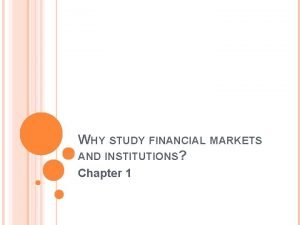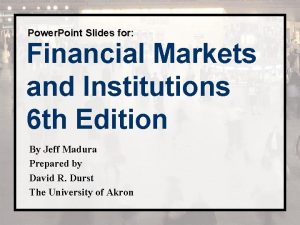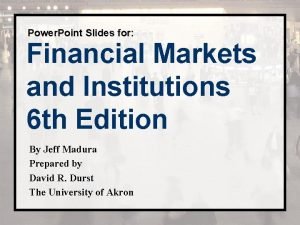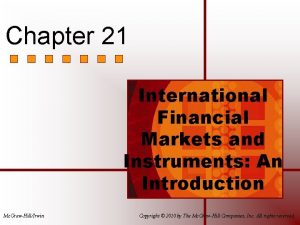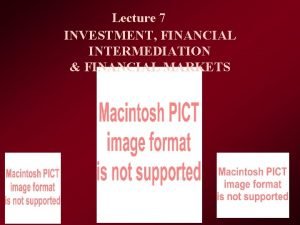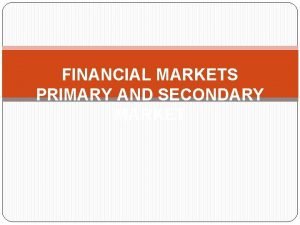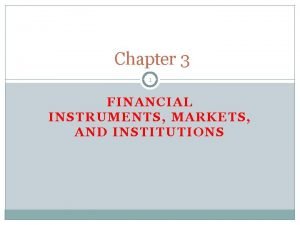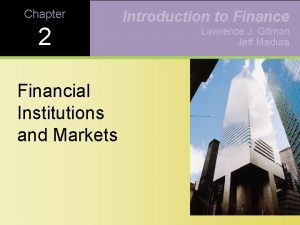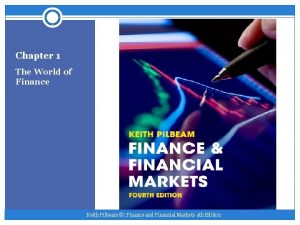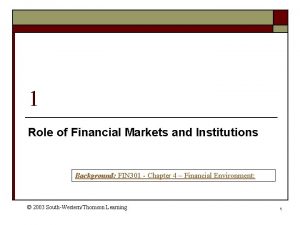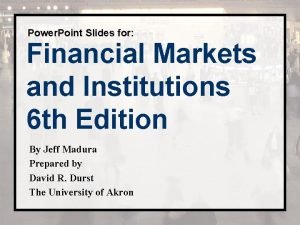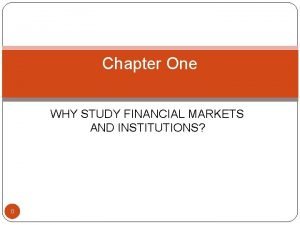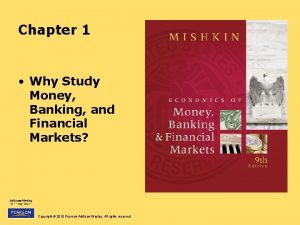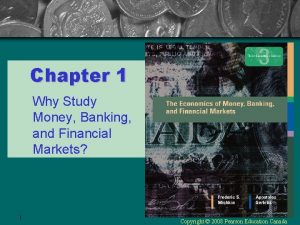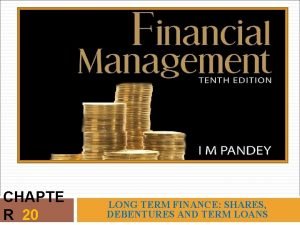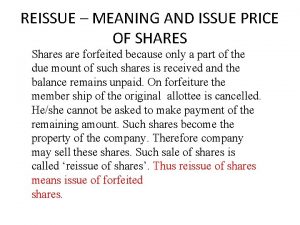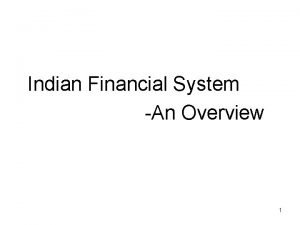Indian Financial Markets Contents Financial Markets Shares and





















- Slides: 21

Indian Financial Markets

Contents • Financial Markets • Shares and Stocks • Regulatory Environment in India • SEBI • RBI

Financial Markets • A Market is a place where buyers and sellers come together to exchange something • Financial Markets are where financial Instruments/products are exchanged. • A Financial Market is known by type of product traded in it

Different Financial Markets FINANCIAL MARKET Money Market Debt Market Forex Market Capital Market

Money Market • Markets for short term • Borrowing • Lending • Primarily used by Banks • Typical Financial Instruments • Bankers Acceptance • Certificate of Deposit (CD) • Treasury Bills • Repo’s

Debt Market • Debt • Contract • One Party lends to another Party • Predetermined • Interest Rates and Term • Participants • • Banks Financial Institutions Mutual Funds Insurance Companies etc. • Instruments • Government Securities (G-Secs) • Public Sector Units Bonds • Corporate Securities

Foreign Exchange Market • Foreign Goods • Payments in Foreign Currency • Forex Market • Participants • Government • Payments for Imports • Repayment of Loans • Importers • Exchange Rates – One Currency in terms of other (Eg. 1 US Dollar = 45 Rupees) • Bid Rate • Offer Rate

Capital Market • Long Term Funds • Raised by • Government • Corporates • Trading Instruments used • Shares • Derivatives • Units of Mutual Funds

Financial Markets • Primary Market • Instruments issued for first time • Used by • Government/Corporates/PSU’s • IPO • Initial Public Offering • Secondary Market • Trading of already issued • Stocks • Bonds • Stock Exchange

• The primary market is that part of the capital markets that deals with the issue of new securities. • Companies, governments or public sector institutions can obtain funding through the sale of a new stock or bond issue. • An initial public offering (IPO), referred simply as an "offering" or "flotation", is when a company (called the issuer) issues common stock or shares to the public for the first time

Secondary Market • The secondary market, also known as the aftermarket, is the financial market where previously issued securities and financial instruments such as stock, bonds, options, and futures are bought and sold.

Stock and Shares • Stock • Capital raised by corporations • Through issue and distribution of shares • Share • Signifies ownership in the company • A company might have thousands of Shareholders.

Stock Exchange • Place where the shares are traded • BSE • NSE • BSE – Bombay Stock Exchange • Oldest Stock Exchange in Asia • Sensex – Sensitive Index • Index of 30 Actively traded Companies • NSE – National Stock Exchange • Incorporated in 1992 • Nifty • Index of 50 Actively traded Companies

Functions of stock exchange • Maintains active trading. • Fixation of prices. • Ensures safe and fair dealing. • Aids in financing the industry. • Dissemination of information. • Performance inducer. • Self regulating organization.

• 1. Bombay stock exchange • 2. National stock exchange(Mumbai) • 3. Banglore stock exchange • 4. Utter pradesh stock exchange(kanpur) • 5. Magadh stock exchange(Patna) • 6. Ahmedabad stock exchange • 7. vadodara stock exchange(Baroda) • 8. Bhubaneswar stock exchange • 9. Calcutta stock exchange(kolkata) • 10. Madras stock exchange

• 11. Cochin stock exchange • 12. coimbatore stock exchange • 13. Gauhati stock exchange • 14. Hydrabad stock exchange • 15. Madhya pradesh stock exchange(indore) • 16. Jaipur stock exchange • 17. Ludhina stock exchange • 18. Mangalore stock exchange • 19. Pune stock exchange • 20. saurashtrakutch stock exchange

Ø » » » » » Ahmedabad Bangalore Bhubaneshwar Calcutta Cochin Coimbatore Delhi Guwahati Hyderabad Jaipur Ludhiana Madhya Pradesh Madras Magadh Mangalore Meerut OTC Exchange Of India Pune Saurashtra Kutch Uttar. Pradesh Vadodara

HOW RATING IS GIVEN TO THE COMPANY? • Basically rating is given after see the company 'image, management quality, assets quality, auditors quality, accounting accuracy. Rating is not fixed, it may be change. The rating grades are: • AAA: HIGHEST SAFTY • AA: HIGH SAFTY • A: ADEQUATE SAFTY • BBB: MODERATE SAFTY • BB: IN ADEQUATE SAFTY • BC&D: HIGH RISK AND DEFAULT

CREDIT RATING AGENCY IN INDIA • 1. CRISIL • 2. ICRA • 3. CARE • 4. DPCR

Regulatory Environment in India • RBI – Reserve Bank of India • Established in 1935 • Bankers Bank • Regulates Indian Financial Markets • SEBI –Securities and Exchange Board of India • Incorporated in 1992 • Regulation of Securities Market • Protecting the interests of Investors

Thank you !!
 Why study financial markets
Why study financial markets Money market participants
Money market participants Financial institutions and markets lecture notes ppt
Financial institutions and markets lecture notes ppt Financial intermediaries and markets
Financial intermediaries and markets International financial markets and instruments
International financial markets and instruments Savers and investors role in financial markets
Savers and investors role in financial markets Difference primary and secondary market
Difference primary and secondary market Efficient capital allocation
Efficient capital allocation Types of exchange rate
Types of exchange rate Basic flow of funds through the financial system
Basic flow of funds through the financial system Madura j. financial markets and institutions
Madura j. financial markets and institutions Pilbeam k. finance and financial markets
Pilbeam k. finance and financial markets Pilbeam finance and financial markets
Pilbeam finance and financial markets Equity securities
Equity securities Madura j financial markets and institutions
Madura j financial markets and institutions Why study financial markets and institutions
Why study financial markets and institutions Chapter 6 consumers, savers, and investors answer key
Chapter 6 consumers, savers, and investors answer key Why study money banking and financial markets
Why study money banking and financial markets Why study money banking and financial markets
Why study money banking and financial markets What are the characteristics of a good research
What are the characteristics of a good research Advantages of preference share
Advantages of preference share Partial underwriting
Partial underwriting
